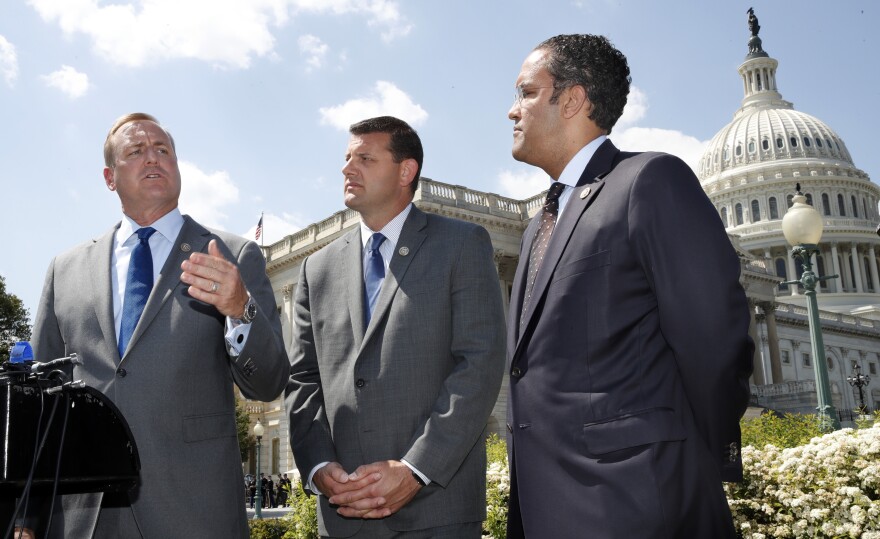Lawmakers return to Capitol Hill this week to confront an unplanned and unpredictable immigration debate. Republicans and Democrats alike believe the outcome could be a decisive factor for voters in elections this November that will determine control of Congress.
A divided House GOP Conference will hold a closed-door session on Thursday to build a strategy around immigration legislation scheduled for the floor the third week of June — a deal promised to the rank-and-file by reluctant GOP leaders before the Memorial Day break.
At a Nashville campaign rally last week in Tennessee, President Trump spoke bluntly about immigration as a midterm election issue that he believes will preserve the GOP's House and Senate majorities.
"The Democrats want to use it as a campaign issue, and I keep saying, 'I hope they do.' The fact is the Democrats are lousy politicians. They are lousy on policy," he said. The president argued that his administration's hard-line immigration policies and recent crackdown on people and families trying to enter the U.S. along the Mexico border is "a good issue for us, not to them."
Conservatives on Capitol Hill agree with the president and are deeply skeptical — if not outright hostile — to any legislation that draws significant Democratic support and creates any new paths to citizenship. They are increasingly at odds with the GOP's more moderate wing that includes lawmakers running for re-election in some of the most competitive congressional districts.
In a series of escalating events prior to the Memorial Day break, conservatives took down a popular farm bill on the House floor to take a stand on immigration. At the same time, moderates continue to agitate for signatures on a discharge petition that would force the hand of party leaders to hold votes on immigration legislation if they reach 218 signatures.
As of Monday, there are 213 signatures on the petition, mostly Democrats.
Rep. Jeff Denham, R-Calif., is one of the leading proponents on the legislative gambit, which is sharply opposed by GOP leaders. Unlike most of his GOP colleagues, Denham has argued the only way forward on immigration legislation this month is a pared-down bipartisan bill that would create a path to citizenship for people who were brought to the U.S. as children but now reside in legal limbo, in exchange for an influx of cash to secure the U.S.-Mexico border.
Denham told CNN that moderates are trying to reach a legislative solution that GOP leaders can support, but are keeping the discharge petition alive as a sort of legislative insurance policy. "We are still working with the speaker, House leadership to come up with that bill, hopefully, a compromised bill, and if not move forward on a full debate in front of the American public," he said.
"We've got enough signatures," Denham added. "We'll have more members signing on as soon as we get back."
The House has not attempted to take up any immigration legislation under Trump because GOP leaders have been unable to draft a bill that can pass on GOP votes alone, and unwilling to advance bipartisan legislation if there is no guarantees Trump would sign it into law.
The president's rhetoric and an emotional and fractious debate about how people and families are being treated along the U.S. Mexico border right now have also mobilized Democrats to fight — not compromise — with Trump on immigration.
Protesters gathered in more than two dozen cities across the country last week to protest the Trump administration's policy of separating immigrant parents and children at the Southern border. At least 600 children were taken from their parents in May as part of the latest crackdown on illegal immigration.
"It is entirely the Donald Trump administration's fault," Rep. Ruben Gallego, D-Ariz., a leader in the Congressional Hispanic Caucus, told MSNBC last week. "This is all because of Donald Trump, and this is all because they're trying to appease their base. That's all this is."
Over the Memorial Day recess, a growing number of congressional Democrats announced plans to introduce legislation to counter Trump's immigration policies.
House Democratic Caucus Chairman Joe Crowley, D-N.Y., announced plans to introduce legislation to enhance congressional oversight over Immigration and Customs Enforcement and Customs and Border Patrol by requiring formal record-keeping and reports to Congress on all stops and searches at the border.
"In order to better protect our country, as well as the rights of every person, we need data on every encounter and stricter oversight of these agencies who've become the key enforcers of President Trump's anti-immigrant agenda," Crowley said in a statement.
Senate Democrats like California's Dianne Feinstein, the top Democrat on the Judiciary Committee, are working on legislation that would block the separation of families at the border. "Congress has a moral obligation to take a stand here," she said in a statement.
The volatile mix of intra-GOP fighting and rising Democratic opposition is fueling more skepticism than confidence that the House will ultimately pass any immigration legislation this month, let alone bills that could clear the Senate's 60-vote hurdle and President Trump's veto pen.
House Majority Leader Kevin McCarthy, R-Calif., winked at that reality last week in an interview with Fox Business News when asked what his priorities would be come 2019, if Republicans hold the majority and he is elected speaker. He said he'd focus on economic growth, and that "means solving immigration."
Copyright 2021 NPR. To see more, visit https://www.npr.org.



